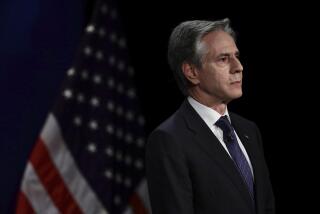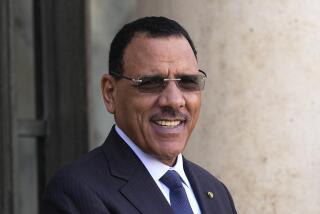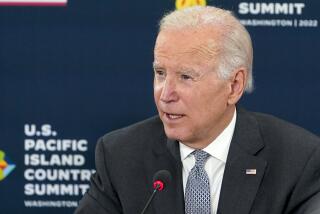U.S. and New Zealand Suspend Aid to Fiji
SUVA, Fiji — The United States and New Zealand today suspended aid to Fiji to protest the coup that ousted an elected government earlier this month.
In a parallel development, hotels and businesses began laying off workers as fallout from the coup struck the tourism and sugar industries, the two mainstays of this South Pacific island nation’s economy.
An American Embassy statement said that U.S. law “prohibits use of foreign aid funds to provide direct assistance to any country whose duly elected head of government is deposed by military coup or decree.”
In New Zealand, Prime Minister David Lange announced the suspension of aid and ordered 47 Fijian soldiers training there to return home.
Soldiers led by Lt. Col. Sitiveni Rabuka overthrew the Indian-dominated administration of Prime Minister Timoci Bavadra on May 14, a month after it took office. Rabuka said that he wanted to reserve political power for native Fijians, who are slightly outnumbered by ethnic Indians.
In Washington, the Agency for International Development said that U.S. aid for fiscal 1987 was programmed for $1.3 million. It said that consultations with the Fijian government on how the funds were to be used were under way at the time of the coup. New Zealand has been one of Fiji’s biggest donors, providing $3.8 million in 1983, according to U.S. State Department figures.
Meantime, Fiji’s crucial sugar crop stands unharvested because of protest action in support of Bavadra. Industry sources said there is a danger that the crop will be badly affected by dry weather if it is not harvested soon. Sugar provides half of Fiji’s foreign exchange revenues, with most of the rest coming from tourism.
Hotels around this nation of 300 islands reported they are either laying off workers or reducing their hours because of a dramatic decline in tourist arrivals. Some hotels say they are now empty.
Since the coup, the United States, Australia and New Zealand have advised prospective tourists not to go to Fiji.
Michael Dennis, president of Fiji’s Hotels Assn., appealed to unions in Australia and New Zealand to end trade embargoes protesting the coup. Dennis told reporters that the ban, which threatens to cause food shortages for the country’s population of 714,000 as supplies of wheat and rice run low, is hurting innocent people and obstructing a return to normalcy.
The election of Bavadra’s government gave Indians a majority in power for the first time since Fiji became independent from Britain in 1970, a development that angered militant indigenous Fijians, who felt they were being ruled by outsiders.
Indians would have no chance at future political power if a committee headed by Rabuka rewrites the constitution according to his present plans.
Indigenous Fijians make up 47% of the archipelago’s 715,000 people, and ethnic Indians make up 49%. Most of the Indians are descended from indentured workers brought here in the 19th Century to work on British-owned sugar plantations.
An Information Ministry spokeswoman said Thursday that Governor General Ratu Penaia Ganilau has promoted Rabuka, who is in charge of the army and police, to the rank of full colonel.
More to Read
Sign up for Essential California
The most important California stories and recommendations in your inbox every morning.
You may occasionally receive promotional content from the Los Angeles Times.










